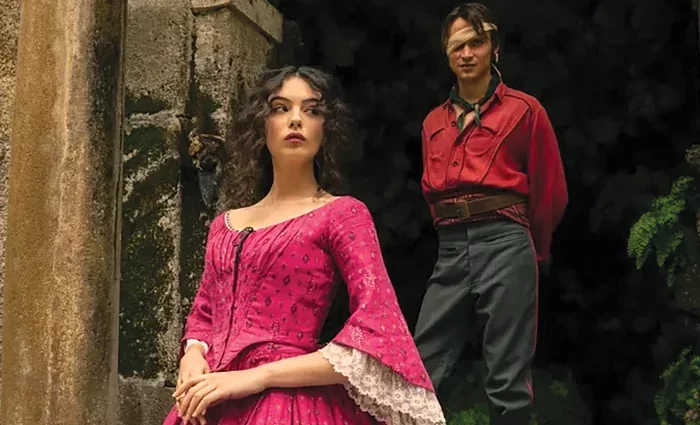Fitting a novel‘s plot into two hours is an undertaking like jamming Cinderella‘s stepsister’s foot into the glass slipper: You have to hack off toes or full limbs. But this is the age of binge-watching, and directors need to make fewer procrustean compromises to runtime now. Instead, they just make a miniseries, a format that offers the salvation of adequate time. A bit of promise, therefore, twinkled faintly and tantalizingly out from Netflix‘s new The Leopard, an adaptation of Giuseppe Tomasi di Lampedusa’s 1958 portrait of Sicilian aristocratic decline.
The Leopard, the sole novel written by Tomasi, published posthumously, is a considerably autobiographical tale of the decline of a Sicilian aristocratic family amid the Risorgimento. It is fantastic. The tone is one of active mourning for the old days of the Kingdom of the Two Sicilies if it also doesn’t really make any sort of argument for its merits. Its protagonist, Prince Fabrizio, adopts the most aristocratic attitude toward change: largely simply ruefully watching it unfold. Tomasi writes that he, “lived in perpetual discontent under his Jovelike frown, watching the ruin of his own class and his own inheritance without ever making, still less wanting to make, any move toward saving it.”

The novel’s events can be summarized fairly easily. Fabrizio’s penniless nephew Tancredi joins Garibaldi’s men and soon finds himself an officer in the army of united Italy. The prince’s daughter Concetta is initially enamored of Tancredi, but his eye is caught by the beautiful Angelica, daughter of vulgar nouveau riche neighbor Don Calogero. The remainder is a series of events rendering poignantly just how thoroughly the Leopard himself is going extinct.
It’s impossible not to compare the new adaptation to the prior Visconti adaptation, which is about as perfect a film as one can get, ideally cast with Burt Lancaster, Alain Delon, and Claudia Cardinale. It is over three hours long, but it seemed possible that the Netflix series, with a runtime double that, might dig more deeply into the tale. It does this occasionally. The prince’s wife, who is something of a briefly glimpsed hysteric in the Visconti film, does receive a more accurate portrait. There’s a little more context surrounding their lives in Sicily. The prince’s nature as a kindly landlord is better elaborated — noblesse oblige in part, also just a sheer disinterest in paying much attention to business. Other things are pleasant. Garibaldi himself is sighted in Palermo. The shift of some plot elements to Turin is entirely forgivable in providing a look at the new rulers.
The series’s expansion of the portrait of the prince’s other children is at first welcome, but this determination to better round out secondary characters soon becomes an enormous problem. The prince is disappointed in his offspring — the family has gone to seed. That’s a central point of the whole narrative. He doesn’t quite agree with his nephew, Tancredi, but sees at least vigor in his character, which is why he favors him. This is all subtly but clearly indicated in the novel and the Visconti film. Narration in the novel notes, “Though the Prince never admitted it to himself, he would prefer the lad as his heir to that booby Paulo.” The miniseries, which will never tap a point lightly that it could instead bludgeon, features his wife saying, “You prefer your nephew to your son and your daughter Concetta to her sisters!”
The prince is often watching things happen with an air of resignation in the novel. The series unspools new plots concerning real estate squabbles, politicking, and new romances in which he takes a much more active and argumentative part. This all dramatically erodes his ironical and sad grandeur, turning our resigned hero into a peevish Lord Grantham.
It’s impossible not to think of other recent monotonous streaming productions when talking about the series, because its aim is squarely for a sort of costume-drama anonymity, which draws it diametrically away from the essence of the novel. The worst of its choices is rekindling the romantic triangle between Tancredi, Concetta, and Angelica, inventing second and third acts to a transfer of affection that’s handled in a few pages in the novel. Turning Concetta, a sympathetic repressed figure, into a modishly liberated female alters not just one character but the spirit of the whole novel.
The bizarre thing is that even with a six-hour runtime, much of the novel material omitted from Visconti’s version is still entirely missing. The book closes with two moving chapters set in stages well after the events of the novel. The narrative also features glancing references to the Second World War. These sorts of chronological leaps might have been fascinating content, but the series ignores them.
THE AMBITIOUS AND DOOMED THE BRUTALIST
The Leopard resolutely avoids any steps that are visually or narratively innovative. The Visconti film made the very indulgent choice to close with a 40-minute ball sequence. The series, working with plenty of time never forsakes a standard television clip. The look of the whole undertaking is also intensely average. There are handsome settings, but they’re all filtered through a look of standard “prestige television” gloss. Tomasi describes a “slightly shabby grandeur” to dinner at the prince’s palace. Their lives unfold in genteel dilapidation. Sicily’s landscape is painted as beautiful but also difficult, almost feral. This is not at all how the series presents them. A striking sequence in Visconti’s film is the very laborious and dusty journey from Palermo to their summer home. The Netflix series looks like a travel promotion.
There are often things best altered or shifted in novel adaptations, and a screen version can certainly err by being too true to the text. But in this case, unfortunately, Netflix quite deliberately forsook what was actually unique about the novel to produce a series resembling every other historical program now on offer — with a few more olive trees.
Anthony Paletta is a writer living in Brooklyn.


